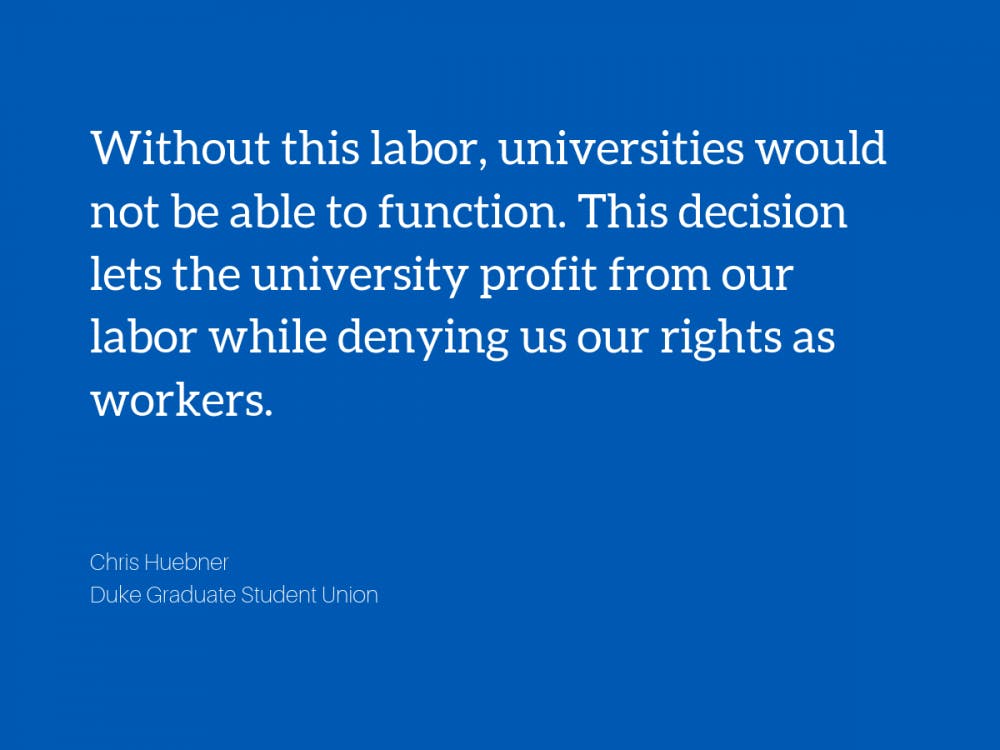As a graduate student and organizer with the Duke Graduate Students Union (DGSU), when I heard about a rule change proposed by the National Labor Relations Board (NLRB) that would prevent undergraduate and graduate students from being considered employees, I felt sick. But the decision should also turn the stomachs of everyone who cares about workers or is an ally to labor.
This decision, supported by three board members appointed by President Trump, reverses a decision made in 2016 that allowed undergrad and grad students to form unions and collectively bargain for better working conditions and benefits. It’s a decision that we should all oppose because it will negatively affect the labor rights and working conditions of students and other workers around the country.
The proposed rule is currently undergoing a sixty day review period, during which the NLRB will review comments received from the public.
This decision will affect graduate students across the country. Over twenty thousand grad students have organized and held union elections since the 2016 ruling. The NLRB’s reversal puts all of that work at risk. Additionally, it jeopardizes contract negotiations between unions and administrators at Columbia University and the University of Chicago, where graduate students have a real chance of winning fair contracts that guarantee better conditions—from improved insurance benefits to increased stipends.
The NLRB argues that grad students should not be considered employees because our relationship with the universities is “primarily educational.” This is nothing more than creative doublespeak that attempts to obscure the important labor we perform for our employers.
Just because our work also involves educational tasks—our own research and coursework for example—does not mean we don’t work, and it doesn’t mean we don’t deserve a right to organize for fair compensation and better working conditions. We serve as TAs in classrooms, grade papers and exams, do important research in labs and out in the field. Without this labor, universities would not be able to function. This decision lets the university profit from our labor while denying us our rights as workers.
We deserve the right to organize for fair compensation and better working conditions, and better working conditions for us means better learning conditions for Duke’s students.
And make no mistake. This is not a decision that just affects graduate students. This is part of the Trump Administration’s efforts to undermine the rights of workers around the country. There are hundreds of thousands of workers around the country who, like graduate students, are in precarious positions and unable to organize for better working conditions. These include healthcare workers, homecare workers, drivers for Uber and Lyft and other workers participating in the gig economy. By determining that graduate students are not “employees,” the NLRB is demonstrating that all kinds of marginalized workers can be denied critical labor rights.
Duke, as a leader in higher education, should show that it stands against the Trump administration's attacks on workers’ rights. Duke should, like NYU, voluntarily recognize and enter into negotiations with DGSU.
Only then can the Duke community of students, faculty and staff have faith that the University is what it says it is: a school that attends “not only to [students’] intellectual growth but also to their development as adults committed to high ethical standards and full participation as leaders in their communities.”
Since forming a little more than two years ago, the DGSU has organized tirelessly for better conditions for all graduate students on campus. Because of DGSU actions, we at Duke have better maternity and paternity leave. We have increased pay caps for non-departmental earnings. We don’t have to pay continuation fees in our sixth year. We have continued gym access in our third through fifth years, which the administration once tried to revoke. And, regardless of what the administration says, DGSU’s Pay Campaign was instrumental to changing Duke’s pay structure to a twelve month stipend worth at least $31,000 per year by the fall of 2022.
While the Trump Administration’s fight against labor rages on, DGSU is fighting for a Fair Contract for grad workers at Duke. Grad students across all disciplines and departments deserve a contract guaranteeing fair pay, good benefits and protections against workplace harassment and discrimination.
Chris Huebner is a graduate student in the English department and the Director of Communications for the Duke Graduate Student Union.
Columnist’s note: If you are a current graduate student at Duke, please join us! We have a lot of work to do, but we’ve shown—in a short time—that we are stronger together and that when we fight, we win! Please visit our website and check us out on social media @dukegradunion to learn more, and join us at dukegradunion.org/join.
Finally, if you oppose the rule, please comment and make your voice heard. Learn more about the decision and fill out a comment in opposition to the proposed rule.
Get The Chronicle straight to your inbox
Signup for our weekly newsletter. Cancel at any time.

